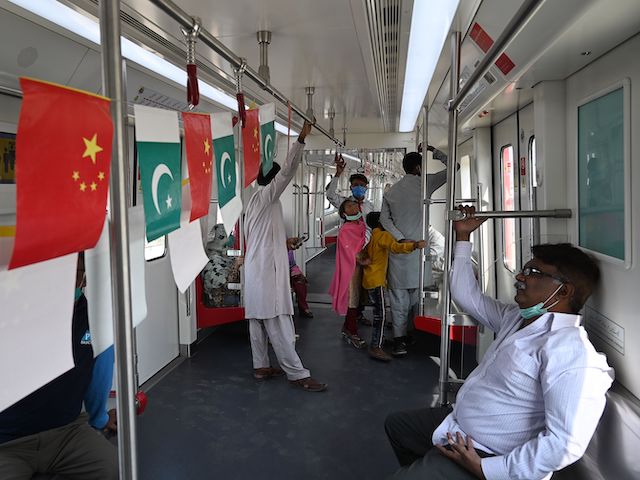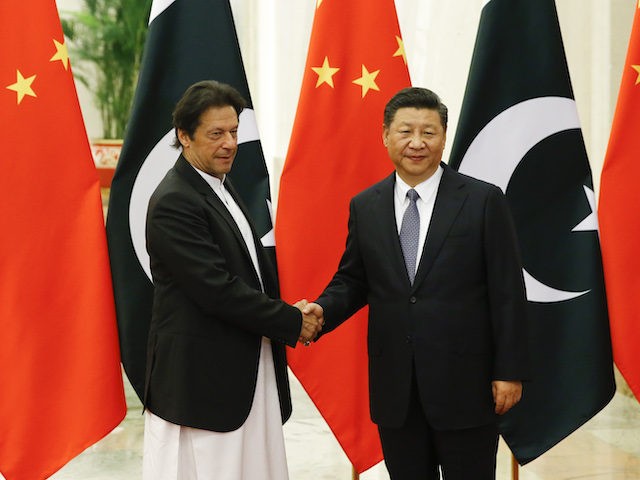Pakistan Prime Minister Imran Khan expressed Pakistan’s “support for China on … Xinjiang” during a meeting with Chinese dictator Xi Jinping on Sunday, the Hindustan Times reported on Monday.
The Indian newspaper cited a joint statement issued by the Chinese Communist Party and the government of Pakistan on February 6 shortly after Khan met with Xi in Beijing for bilateral talks.
“The Pakistan side expressed its commitment to One-China Policy and support for China on Taiwan, South China Sea, Hong Kong, Xinjiang and Tibet,” the press release read.
Xinjiang is the Mandarin name for East Turkistan, an occupied region. The Central Asia frontier region is home to the majority of the world’s Uyghur population, who have no cultural, religious, or linguistic ties to the majority Han ethnic group of China.
The Chinese Communist Party has imprisoned an estimated 1 to 3 million Uyghurs, Kazakhs, and Kyrgyz people in concentration camps since about 2017, an action “which the U.S. government has designated as genocide and crimes against humanity,” the U.S. Commission of International Religious Freedom reported in October 2021.

Passengers ride in a newly built Orange Line Metro Train (OLMT), a metro project planned under the China-Pakistan Economic Corridor (CPEC), a day after an official opening in the eastern city of Lahore on October 26, 2020. (Arif Ali/AFP via Getty Images)
“[T]hey [Uyghurs] now make up roughly half of the region’s population of 24.8 million, according to official sources,” the U.S. Congressional Research Service reported of Xinjiang’s demographics in January. Scholars have loudly refuted official demographic statistics, accusing China of manipulating the numbers.
Uyghurs and other ethnic minorities in Xinjiang, such as Kazakhs and Kyrgyz people, are largely Turkic-speaking and adherents of Sunni Islam. Pakistan, which borders Xinjiang, recognizes Sunni Islam as its official state religion. Pakistan Prime Minister Imran Khan regularly advocates for the protection of Islamic fundamentalism. He led an “online discussion on ‘Islam, society and ethical values'” on January 1 in which he argued that the two chief evils within the Muslim world are moral “corruption and sex crimes,” according to the Print, an Indian news site.
Khan said his “major worry” concerns how to protect Muslim youth from the “invasion of social media on their faith and religious and ethical values.”
The Pakistani prime minister “stressed the need to save young Muslims from being ‘inundated with obscenity and pornographic material available on the internet,'” the Print relayed on January 5.
Khan in April 2021 proposed forming a coalition of 50 Muslim nations so that it could organize to help push Islamist agendas worldwide when desired.
“The prime minister said once all the Muslim countries were united, they would send a strong message that if blasphemy was committed against [the Islamic] Prophet Muhammad, the ’50 states would observe a trade boycott with them — which would have an impact,'” Pakistan’s Geo News reported on April 26, 2021.
“Only then we can achieve our goal and be successful,” Khan said.

Prime Minister Imran Khan of Pakistan meets with Chinese President Xi Jinping (not pictured) at the Diaoyutai State Guesthouse on October 9, 2019 in Beijing, China. (Photo by Parker Song-Pool/Getty)
According to a Pew Research Center report, 49 countries had majority Muslim populations as of 2017. Several of these nations are located in South or Central Asia and directly border East Turkistan. These states include Pakistan (96 percent Muslim, largely Sunni), Kyrgyzstan (80 percent Sunni Muslim), Kazakhstan (70 percent Muslim, largely Sunni), Tajikistan (90 percent Muslim, largely Sunni), and Afghanistan (99 percent Muslim, largely Sunni).
Some of these majority Sunni Muslim states, such as Pakistan and Afghanistan, have Uyghur communities living within their borders. The International Forum for Rights and Security published a report in January accusing the Pakistani government of “transnational repression” against some Uyghurs – including forced deportations — at the behest of the Chinese Communist Party.
The U.S. government said in October 2021 it feared the Taliban, a Sunni fundamentalist group currently ruling Afghanistan, could cooperate with China to forcibly deport members of its Uyghur communities as well.
“Afghanistan’s small Uyghur Muslim community — thought to number around 2,000 to 3,000 and many are second and third-generation Afghan citizens — has expressed fear that the Taliban could deport them to China where they face egregious persecution,” the U.S. Commission of International Religious Freedom wrote in October 2021.
“There are concerns that the Chinese government could use its economic and geopolitical leverage to pressure the Taliban to deport these Uyghurs,” the commission said.

COMMENTS
Please let us know if you're having issues with commenting.